Are you looking to achieve financial freedom and gain control over your finances? Look no further than the best finance books for beginners. In this article, we’ll dive into the top picks for those who want to learn the fundamentals of wealth-building and achieve financial independence.
From budgeting to investing, these books provide a foundation for financial literacy, helping you navigate expenses, debt, and savings. They offer guidance on how to build a passive income stream that exceeds your living expenses, leading to financial independence.
But where to start? I’ve curated a list of the best finance books for beginners, based on careful consideration and research. These books represent the pillars of a beginner’s finance education, providing you with essential knowledge and actionable steps to grow your wealth.
Ready to take control of your finances and start your journey toward financial independence? Let’s dive in and remember: the books in this list represent the pillars of a beginner’s finance education.
While financial knowledge is not often taught in schools, these books serve as an essential crash course for anyone who wishes to master the art of money management.
Note: Some links may earn us a commission at no cost to you. Learn more in our privacy policy.

What are the best finance books for beginners?
1. The Richest Man in Babylon by George Clason
Teaches personal finance lessons through parables set in ancient Babylon, providing a simple yet effective approach to wealth-building.
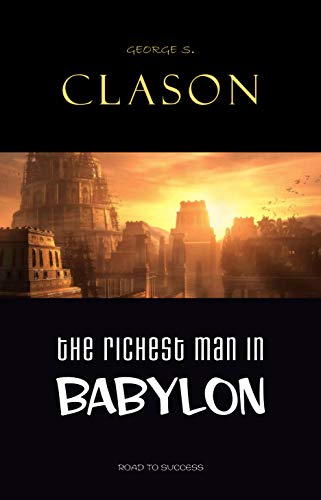
This is arguably the best finance book for beginners.
The Richest Man in Babylon is an incredible book in its simplicity and the way it teaches you about finance. It’s a series of personal finance lessons taught through parables set in ancient Babylon.
It uses ancient Babylon as the setting for all the stories it tells, and through these stories, you will see how simple gaining wealth is. We like to complicate our lives all the time, but when it comes to financing it’s important to keep things simple. This book will help you with this.
The book is an easy read, you can finish it in just a day or two of laid-back reading. It will give you pillar advice in finance, and help you start forming fundamental personal finance habits.
Recall that the most profound wisdom often lies in simplicity; these ancient parables are timeless, offering financial guidance that remains relevant even today. So go get it, and ‘start thy purse to fattening‘ ;).
2. Get a Financial Life by Beth Kobliner
Provides practical financial advice for young adults, covering everything from budgeting to retirement planning.
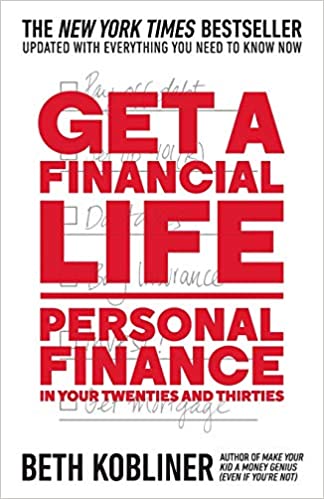
If you are in your 20s read it now. If you are older, read it yesterday.
The book is filled with loads of practical basic financial information, easy to read and understand.
Get a Financial Life will give you the basics of financial planning, from money markets to CDs and IRAs. By the time you finish the book, you’ll be well versed in the lingo of the financial world.
Being an extremely helpful book, you’ll refer to this book later on as a reference when you have questions about finance. It’s an extremely helpful read, written to be understood by everyone, and will start building the motivation you need to save money and start taking care of your money. If you don’t take care of your money, your money won’t take care of you.
Though times have changed and technology plays a massive role in finances today, the foundational principles remain constant, and Kobliner’s book stands as a testament to that.
P.S. If a few concepts don’t seem to come easy to you, don’t worry. It’s normal, just move on to the next book and keep reading.
3. The Simple Path to Wealth by JL Collins
Offers clear, straightforward advice on investing and achieving financial independence.
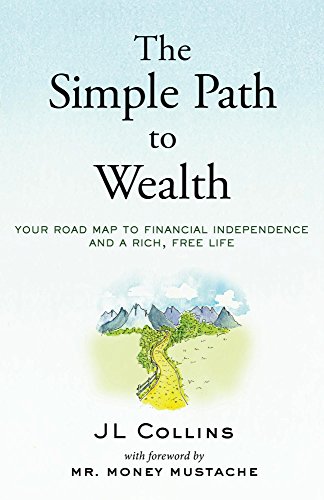
This book is about achieving financial independence slowly.
It’s not about getting rich quick. It’s not about scamming the system or using complicated strategies to invest. It’s about using sound principles to achieve financial wealth.
Being a straightforward investment book filled with humor and empathy, it’s very accessible and it will explain to you important concepts about financial independence in a fun way.
The Simple Path to Wealth goes straight to the point with clear advice on investing. Some people think investing is difficult and complex, but at its core, it’s very simple. This book will help you see that.
Building wealth is often misunderstood as a rapid sprint when in reality, it’s more of a steady, disciplined marathon. Taking a slow and steady approach can pay off significantly in the long run. Though MJ Demarco would disagree to that.
4. The Millionaire Next Door by Thomas Stanley
Challenges common misconceptions about millionaires and offers insights into the habits and behaviors of the wealthy.
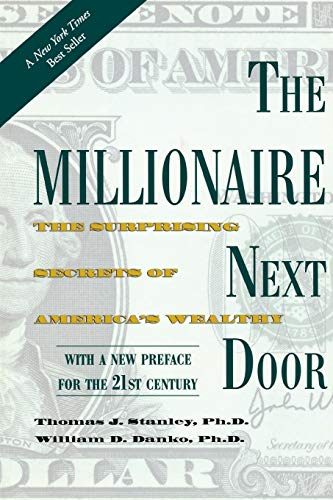
When you think of a millionaire, what do you picture?
Do you picture someone spending a lot of money on flashy clothing, cars, and parties? If you do, then you’re just like me and most of the people in the US.
But we are wrong.
Most millionaires aren’t like that. They don’t spend money needlessly – they are frugal. They don’t gamble – they invest in sure things, such as index funds. Most of them own a home, are first-generation affluent, and didn’t receive any inheritance. Most millionaires live below their means, even after they become rich. And most of them are well educated and save like crazy.
The Millionaire Next Door is something like an interpretation book of the biggest experiment on millionaires ever done. For most of us, it changed the picture of our reality. It will show you how millionaires live, who they are, and how they became millionaires in the first place. It doesn’t mean we have to be like this, but it gives a fascinating insight into the average US millionaire.
The conclusions from the experiment in this book are fascinating, but you can easily read a third of this book and skip the rest. Afterward, it’s just beating a dead horse honestly, and I just want to save you some time.
5. The Millionaire Fastlane by MJ DeMarco
Challenges traditional wealth-building methods, promoting accelerated success through entrepreneurship.
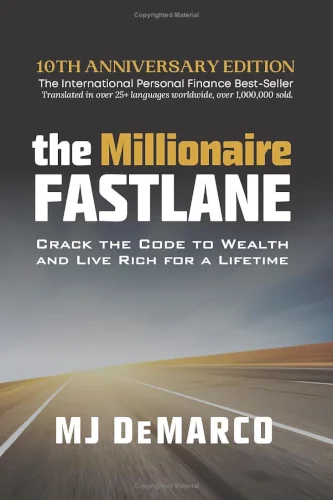
Ever felt that waiting decades to achieve financial freedom sounds… well, slow? Enter “The Millionaire Fastlane.”
Unlike many of the books listed here that advocate a steady, incremental approach to wealth-building, DeMarco turns the spotlight on aggressive entrepreneurship.
Instead of patiently investing into funds and waiting for the compound effect, he challenges readers with a question: Why not fast-track your way to riches and enjoy the benefits in your prime?
While it’s crucial to understand the fundamental principles of saving and investing, this book opens your eyes to the potential of accelerated wealth. It’s not about reckless risks; it’s about calculated entrepreneurship. If you’re eager to embrace a more daring path to financial success and enjoy wealth while you’re still young enough to fully savor it, this is your playbook.
6. Your Money or Your Life by Vicki Robin and Joe Dominguez
Emphasizes the importance of aligning your spending with your values and offers practical tools for achieving financial independence.
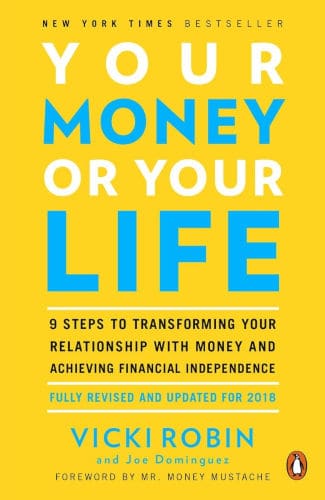
If you’re new to financial independence and the FIRE movement, then this book will most surely leave a lasting impression on you.
It’s one of the most lucid, insightful, and valuable books on money. I’ve met people who said they think about this book years after they read it. That’s how powerful it can be. The idea of early retirement on a small wage may be ludicrous to some, but this book shows how it’s not crazy at all. It is possible.
YMYL may not be the most modern book on investing, but it does a great job of teaching you how to start organizing your finances from a total net worth perspective, not just budgeting from paycheck to paycheck. So pay attention to those chapters.
This book may or may not be revolutionary for you. One thing is certain: it will probably change your emotional relationship with money, and the way you look at and experience the material world.
7. I Will Teach You to be Rich by Ramit Sethi
Provides step-by-step advice on everything from budgeting to investing, with a focus on practical, actionable strategies.
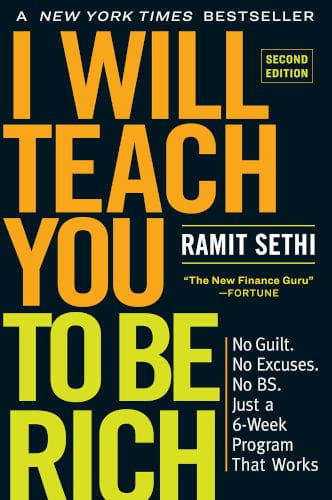
One of the best finance books for beginners, by far. Everyone should read this.
It gives you step-by-step practical suggestions for getting your finances in order. This book is different than many other financial books, as it has a variety of different, practical suggestions rather than one main advice for attaining financial independence.
I Will Teach You to Be Rich is geared towards the younger generation and beginners in finance, but if you’re new to the FIRE movement this book is for you, no matter your age. And the fact is, the sooner you read this book, the better. It’s well worth the price and the read time because it’ll give you a solid foundation and concrete tools to use in many situations to reach your financial goals.
8. The Little Book of Common Sense Investing by John Bogle
Offers clear advice on investing in low-cost index funds, emphasizing the importance of consistency and discipline.
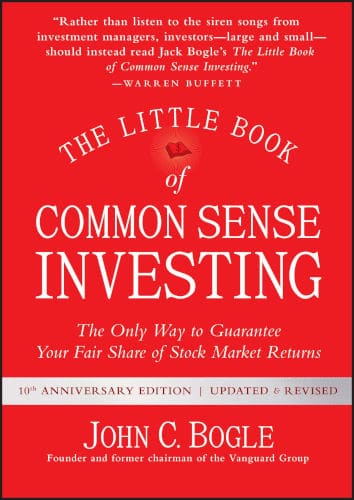
To become wealthy, you need to start investing.
The sooner you start, the better, and this is a great book to get you into that world. This book is easy to follow, and you shouldn’t get scared because it has the word “investing” in it. You need to invest. You should invest.
The author John C. Bogle was the founder & CEO of Vanguard, and he created index investing.
Don’t know the best investment? Then this Little Book of Common Sense Investing will show you the best one. What the heck, I’ll tell you: it’s an index fund. Investing in index funds, and being consistent about it is one of the best ways to get rich.
The market always grows, so investing in S&P 500 index or a total market index is a no-brainer. Keep buying consistently over time, stay on course and always assess your risk correctly (have enough cash or bonds on hand to sleep well at night).
9. Your Money and Your Brain by Jason Zweig
Explores the psychology of investing and offers strategies for avoiding common behavioral biases.
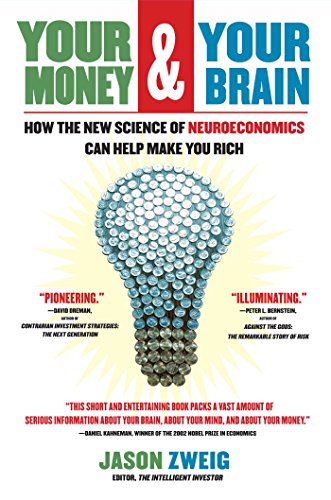
After the basics, it’s important to learn about the psychological aspect of investing, so you can avoid the mistakes most investors make.
Your Money and Your Brain is a behavioral finance book, easily accessible to beginner investors. It touches on how the body reacts physically and mentally to the changing stock market. It does this through a fascinating survey that demonstrates how people can be convinced to act against their interests, senses, and goals.
The human brain is ancient and is still optimized for the hunter-gatherer society where humans have spent most of their existence. To overcome obstacles that come from this, Zweig will steer you with suggestions he leaves after every chapter that will help you to avoid getting tricked.
It will help you obsess less about the stock market, and increase your happiness, which comes from being involved in a community and having a cause, rather than having possessions that fade over time.
An interesting read, and a must to get a glimpse into the psychology of an average investor.
10. You Can Be a Stock Market Genius by Joel Greenblatt
Offers a unique perspective on value investing and provides practical advice for identifying special situations and opportunities in the stock market.
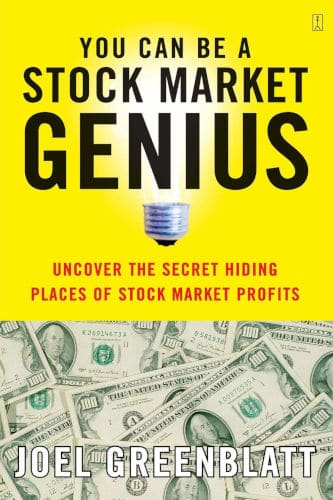
This is an excellent book overall and one of the best value investing books ever written. Being quite different from almost all other similar books, it focuses on finding special situations to invest in.
You Can Be a Stock Market Genius will open your eyes to new opportunities to look out for when investing, from spinoffs, mergers, and takeovers to bankruptcies. The book does this in a very simple and fun way.
Joel was able to make reading about complex topics painless and fun, which is why this book is an excellent read for beginners looking to get into investing.
And invest we must. So go get it, read it, and increase your value. You will notice that when you increase your value, your material wealth will increase as well, and with this, your ability to take care of your friends and family, and improve your community and the world.
11. The Psychology of Money by Morgan Housel
An insightful book that examines the link between human behavior and money, offering valuable lessons to improve financial well-being.
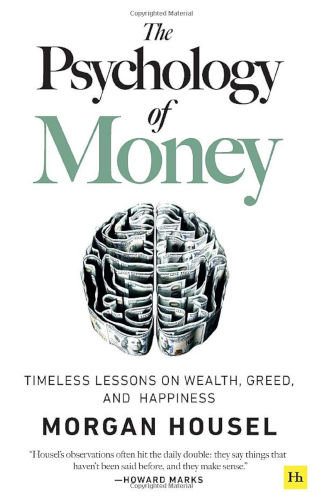
This book explores the complex relationship between money and human behavior, offering insights into the psychological biases that can affect our financial decisions.
Through a series of stories and examples, Housel demonstrates how to develop a healthy relationship with money, including the importance of patience, humility, and a long-term perspective.
The Psychology of Money is an engaging and thought-provoking read that offers valuable and practical lessons for anyone looking to improve their financial well-being.
Final thoughts
Money management at its core is relatively simple, but it can become complex if we fail to recognize and stick with the basic principles that grow our wealth.
Budget and reduce expenses, pay down high-interest debts, contribute to IRA, save for retirement, invest consistently and enjoy life. But to do that, we need to learn, and these books help greatly so we can get wealthy, take care of our families, improve our communities and live happier lives in general.





